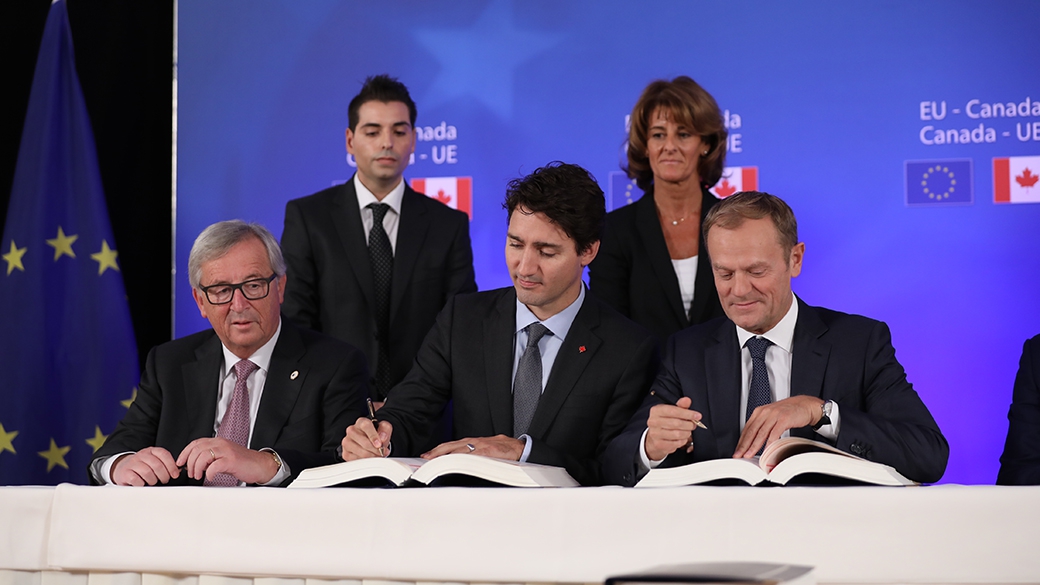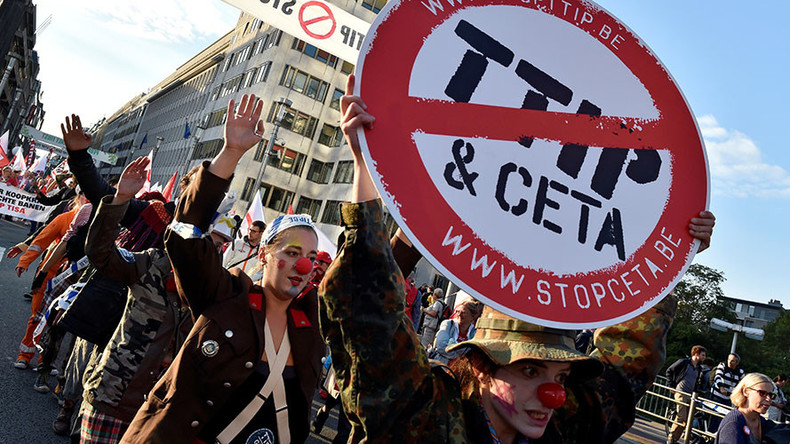CETA is considered a ‘mixed agreement’, meaning that it concerns issues of EU and member state competence; the EU cannot sign on behalf of all members on all issues. Thus, in order for CETA to be fully applied in the EU, the final agreement must be ratified by both the European Parliament and every single EU member state. All members have signed the agreement, allowing it to be provisionally applied and seven members have completed the ratification process, leaving 21 who still need to do so. Until all 28 member states ratify the agreement, CETA cannot be completely applied. Some EU member states have had a negative response to CETA and have threatened to reject the agreement.

Canadian Prime Minister Justin Trudeau, European Commission President Jean-Claude Juncker, and European Council President Donald Tusk sign the final CETA agreement in 2016 in Brussels
The first major obstacle to the completion of the agreement came from Romania. Before CETA, Romanians and Bulgarians were required to have a visa before travelling to Canada while all other EU member states were not. Romania raised this as an issue during the CETA negotiations and threatened not to sign the deal if the ban remained in place, which led to Canada lifting the visa restrictions in early 2017.
A more high-profile case of a member state threatening not to sign CETA came from Belgium in late 2016. The French-speaking province of Wallonia blocked the signing process in Belgium, citing concerns that CETA might undermine labour, environmental, and consumer standards and allow multinational corporations to crush local companies. The Belgian government agreed to the concessions of the Walloon government, including an environmental assessment of the deal and promising to bring the investor-state tribunal before the European Court of Justice. Soon after, the Walloon government voted overwhelmingly in favour of CETA, ending the uncertainty that Belgium might not sign the agreement.
Germany has also shown opposition to signing the agreement. In 2016, two separate complaints came before the German Federal Constitutional Court, asking the court to determine the legality of CETA. The main issues in front of the Court involve the investment and investor-state dispute mechanism provision of CETA. The German Court allowed the agreement to be provisionally applied on 13 October 2016.
Italy has also shown opposition to CETA following their federal election in the Spring of 2018. The new Italian government, made up of several far-right politicians, have threatened to not ratify the agreement. Their reasons against ratification mostly have to do with protecting Italian speciality foods, such as Asiago cheese and Pancetta meat, even though CETA has a provision which protects them already. However, since these concerns were raised after CETA was provisionally applied, it is unlikely that Italy will cause the deal to disintegrate.

Protests against CETA and TTIP (Trans-Atlantic Trade and Investment Partnership) in Brussels
Check out the links below to read about the ratification process and protests against CETA in the EU:
“Italy won’t ratify EU free-trade agreement with Canada, agriculture minister says,” The Globe and Mail
“France to ratify CETA next year, seeks ‘green veto,’” Euractiv
“Departing Slovak envoy forsees ‘smooth’ CETA ratification,” The Hill Times
“European parliament passes EU-Canada free trade deal amid protests,” The Guardian
“Ratifying CETA after ‘Achmea Scandal’ is anti-European,” EU Observer
Click HERE to see exactly what CETA does.
Sources:
CBC, “Canada prepares to lift Romanian visa rules to smooth way for EU trade deal,”
National Post, “Wallonia region no longer a threat to Canada-EU trade deal, but the work isn’t over, says Belgian deputy PM”
Deutsche Welle, “Germany’s top court allows CETA trade deal to go ahead”
Reuters, “Italy says it won’t ratify EU-Canada trade deal; Canada plays down threat”